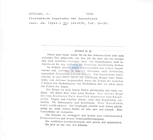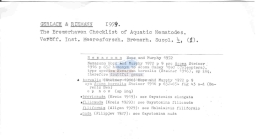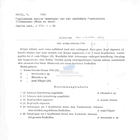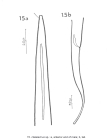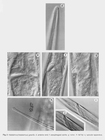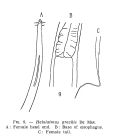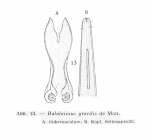
|
World Database of NematodesLinked to the Marine Biology Section, UGent |
| Start | Browse taxonomy |
Search taxonomy |
Search literature |
Search distributions |
Identification keys |
Media gallery | Editors | Statistics | Citations | Match taxa | Contact | Login |
WoRMS taxon detailsHalalaimus de Man, 1888
2548 (urn:lsid:marinespecies.org:taxname:2548)
accepted
Genus
Acoma Steiner, 1916 · unaccepted > junior homonym
Halalaimoides Cobb, 1933 · unaccepted (Hope & Murphy, 1972 p 9)
Halalaimus (Pachyodora) Wieser, 1953 · unaccepted (synonym of Halalaimus Lorenzen,...)
synonym of Halalaimus Lorenzen, 1981p 306 Nemacoma Hope & Murphy, 1972 · unaccepted > junior subjective synonym
Nuada Southern, 1914 · unaccepted
Tycnodora Cobb, 1920 · unaccepted
marine, brackish, fresh, terrestrial
de Man, J. G. (1888). Sur quelques nématodes libres de la mer du Nord, nouveaux ou peu connus. <em>Mémoires de la Société Zoologique de France.</em> 1: 1-51., available online at http://biostor.org/reference/61577
page(s): 2 [details]
Nemys eds. (2024). Nemys: World Database of Nematodes. Halalaimus de Man, 1888. Accessed through: World Register of Marine Species at: https://www.marinespecies.org/aphia.php?p=taxdetails&id=2548 on 2024-07-26
Date action by 2004-12-21 15:54:05Z created db_admin 2006-09-12 06:54:36Z changed Martinez, Olga
original description
de Man, J. G. (1888). Sur quelques nématodes libres de la mer du Nord, nouveaux ou peu connus. <em>Mémoires de la Société Zoologique de France.</em> 1: 1-51., available online at http://biostor.org/reference/61577
page(s): 2 [details] original description (of Nemacoma Hope & Murphy, 1972) Hope, W. D.; Murphy, D. G. (1972). A taxonomic hierarchy and checklist of the genera and higher taxa of marine nematodes. <em>Smithsonian Contributions to Zoology.</em> 137: 1-101. page(s): 9; note: pro Acoma Steiner, 1916 p 652 homonym to Acoma Casey, 1890 (Coleoptera) [details] Available for editors original description (of Nuada Southern, 1914) Southern, R. (1914). Clare Island Survey. Nemathelmia, Kinorhyncha, and Chaetognatha. <em>Proceedings of the the Royal Irish Academy.</em> 31, part 54, section 3: 1-80, plates I-XII. (look up in IMIS) page(s): 9; note: Clare Island, Irish coast on Atlantic [details] original description (of Tycnodora Cobb, 1920) Cobb, N. A. (1920). One hundred new nemas (type species of 100 new genera). <em>Contributions to a science of nematology.</em> 9: 217-343., available online at https://www.biodiversitylibrary.org/page/18212644 page(s): 231 [details] original description (of Acoma Steiner, 1916) Steiner, G. (1916). Freilebende Nematoden aus der Barentssee. <em>Zoologische Jahrbücher.</em> 39: 511-664. page(s): 652; note: Homonym to Acoma Casey, 1890 (Coleoptera) [details] original description (of Halalaimoides Cobb, 1933) Cobb, N. A. (1933). New nemic genera and species, with taxonomic notes (Ed. by Margaret V. Cobb). <em>Journal of Parasitology.</em> 20(2): 81-94. page(s): 83; note: Lapsus: acuminata [details] Available for editors original description (of Halalaimus (Pachyodora) Wieser, 1953) Wieser, W. (1953). Reports of the Lund University Chile expedition 1948-1949: 1. Enoploidea. <em>Lunds Universitets Årsskrift, N. F.</em> 49(6): 1-155. (look up in IMIS) page(s): 33; note: new subgenus of Halalaimus [details] Available for editors taxonomy source Schuurmans Stekhoven, J. H. Jr. (1935). Nematoda: Systematischer Teil, Nematoda errantia. <em>Grimpe, G. and E. Wagler, Die Tierwelt der Nord- und Ostsee (Leipzig 1935).</em> V b: 1-173. (look up in IMIS) page(s): 21; note: Nuada synonym with Halalaimus [details] Available for editors taxonomy source Filipjev, I. N. (1927). Les Nématodes libres des mers septentrionales appartenant a la famille des Enoplidae. <em>Arch. Naturgesch.</em> 91 A (6): 1-216. page(s): 111-116; note: Halalaimus, Nuada & Tycnodora [details] Available for editors taxonomy source Wieser, W. (1953). Reports of the Lund University Chile expedition 1948-1949: 1. Enoploidea. <em>Lunds Universitets Årsskrift, N. F.</em> 49(6): 1-155. (look up in IMIS) page(s): 35-37; note: revision genus [details] Available for editors basis of record Nemaslan: Biodiversity of Antarctic Nematodes (2004). (look up in IMIS) [details] additional source Brunel, P., L. Bosse & G. Lamarche. (1998). Catalogue of the marine invertebrates of the estuary and Gulf of St. Lawrence. <em>Canadian Special Publication of Fisheries and Aquatic Sciences, 126.</em> 405 pp. (look up in IMIS) [details] Available for editors additional source Tita, G., G. Desrosiers, M. Vincx & C. Nozais. (2000). Predation and sediment disturbance effects of the intertidal polychaete Nereis virens (Sars) on associated meiofaunal assemblages. <em>Journal of Experimental Marine Biology and Ecology.</em> 243(2): 261-282. (look up in IMIS), available online at https://doi.org/10.1016/s0022-0981(99)00116-1 [details] Available for editors additional source Modig, H. & E. Olafsson. (1998). Responses of Baltic benthic invertebrates to hypoxic events. Journal of Experimental Marine Biology and Ecology 229:133-148. [details] Available for editors additional source Danovaro, R.; Gambi, M. C.; Dell'Anno, A.; Corinaldesi, C.; Fraschetti, S.; Vanreusel, A.; Vincx, M.; Gooday, A. J. (2008). Exponential decline of deep-sea ecosystem functioning linked to benthic biodiversity loss. <em>Current Biology.</em> 18(1): 1-8 + supplemental data: S1-S6; 1-16. (look up in IMIS), available online at https://doi.org/10.1016/j.cub.2007.11.056 [details] Available for editors additional source Da Rocha, C. M. C.; Venekey, V.; Bezerra, T. N. C.; Souza, R. B. (2006). Phytal marine nematode assemblages and their relation with the macrophytes structural complexity in a Brazilian tropical rocky beach. <em>Hydrobiologia.</em> 553:219-230. [details] Available for editors additional source Fonseca, G.; Soltwedel, T.; Vanreusel, A.; Lindegarth, M. (2010). Variation in nematode assemblages over multiple spatial scales and environmental conditions in Arctic deep seas. <em>Progress in Oceanography.</em> 84 (3-4): 174-184., available online at https://doi.org/10.1016/j.pocean.2009.11.001 [details] Available for editors additional source Gagarin, V. G.; Nguyen Vu Thanh. (2004). Four species of the genus Halalaimus de Man, 1888 (Nematoda: Enoplida) from Mekong River Delta, Vietnam. <em>International Journal of Nematology.</em> 14 (2): 213-220. [details] Available for editors additional source Gheskiere, T. (2000). Structurele diversiteit van nematodengemeenschappen van de Bligh Bank (Zuidelijke Bocht van de Noordzee). [details] Available for editors additional source Guo, Y.; Helléouet, M.-N.; Boucher, G. (2008). Spatial patterns of meiofauna and diversity of nematode species assemblages in the Uvea lagoon (Loyalty Islands, South Pacific). <em>Journal of the Marine Biological Association of the United Kingdom.</em> 88(5), 931–940. [details] Available for editors additional source Fonseca, G.; Decraemer, W.; Vanreusel, A. (2006). Taxonomy and species distribution of the genus Manganonema Bussau, 1993 (Nematoda: Monhysterida). <em>Cahiers de Biologie Marine.</em> 47 (2): 189-203. [details] Available for editors additional source Jensen, P. (1983). Meiofaunal abundance and vertical zonation in a sublittoral soft bottom, with a test of the Haps corer. <em>Marine Biology.</em> 74: 319-326. [details] Available for editors additional source Buhl-Mortensen, L.; Vanreusel, A.; Gooday, A. J.; Levin, L. A.; Priede, I. G.; Buhl-Mortensen, P.; Gheerardyn, H.; King, N. J.; Raes, M. (2010). Biological structures as a source of habitat heterogeneity and biodiversity on the deep ocean margins. <em>Marine Ecology.</em> 31: 21-50. [details] Available for editors additional source Copley, J. T. P.; Flint, H. C.; Ferrero, T. J.; Van Dover, C. L. (2007). Diversity of meiofauna and free-living nematodes in hydrothermal vant mussel beds on the northern and southern East Pacific Rise. <em>J. Mar. Biol. Ass. U.K.</em> [details] Available for editors additional source Commito, J.A. & G. Tita. (2002). Differential dispersal rates in an intertidal meiofauna assemblage. <em>Journal of Experimental Marine Biology and Ecology.</em> 268(2): 237-256. [details] Available for editors additional source Gobin, J. F. (2007). Free-living marine nematodes of hard bottom substrates in Trinidad and Tobago, West Indies. <em>Bulletin of Marine Science.</em> 81(1): 73–84. [details] additional source Lambshead, P. J. D.; Brown, C. J.; Ferrero, T. J.; Hawkins, L. E.; Smith, C. R.; Mitchell, N. J. (2003). Biodiversity of nematode assemblages from the region of the mining Clarion-Clipperton Fracture Zone, an area of commercial mining interest. <em>BMC Ecology.</em> 3: 1-12. [details] Available for editors additional source Austen, M. C.; Widdicombe, S. (1998). Experimental evidence of effects of the heart urchin Brissopsis lyrifera on associated subtidal meiobenthic nematode communities. <em>Journal of Experimental Marine Biology and Ecology.</em> 222: 219-238. [details] Available for editors additional source Miljutin, D. M.; Gad, G.; Miljutina, M. M.; Mokievsky, V. O.; Fonseca-Genevois, V.; Esteves, A. M. (2010). The state of knowledge on deep-sea nematode taxonomy: how many valid species are known down there?. <em>Marine Biodiversity.</em> 40(3): 143-159., available online at https://doi.org/10.1007/s12526-010-0041-4 [details] Available for editors additional source Van Gaever, S.; Galéron, J.; Sibuet, M.; Vanreusel, A. (2009). Deep-sea habitat heterogeneity influence on meiofaunal communities in the Gulf of Guinea. <em>Deep Sea Research Part II: Topical Studies in Oceanography.</em> 56(23): 2259-2269., available online at https://doi.org/10.1016/j.dsr2.2009.04.008 [details] Available for editors additional source Van Gaever, S.; Moodley, L.; De Beer, D.; Vanreusel, A. (2006). Meiobenthos at the Arctic Håkon Mosby Mud Volcano, with a parental-caring nematode thriving in sulphide-rich sediments. <em>Marine Ecology Progress Series.</em> 321: 143-155., available online at https://doi.org/10.3354/meps321143 [details] Available for editors additional source Van Gaever, S.; Olu, K.; Derycke, S.; Vanreusel, A. (2009). Metazoan meiofaunal communities at cold seeps along the Norwegian margin: Influence of habitat heterogeneity and evidence for connection with shallow-water habitats. <em>Deep Sea Research Part I: Oceanographic Research Papers.</em> 56(5): 772-785., available online at https://doi.org/10.1016/j.dsr.2008.12.015 [details] Available for editors additional source Van Gaever, S.; Vanreusel, A.; Hughes, J.; Bett, B.; Kiriakoulakis, K. (1999). The macro- and micro-scale patchiness of meiobenthos associated with the Darwin Mounds (north-east Atlantic). <em>Journal of the Marine Biological Association of the UK.</em> 84(3): 547-556., available online at https://doi.org/10.1017/s0025315404009555h [details] Available for editors additional source Vanreusel, A.; Fonseca, G.; Danovaro, R.; Da Silva, M. C.; Esteves, A. M.; Ferrero, T.; Gad, G.; Galtsova, V.; Gambi, C.; Da Fonsêca Genevois, V.; Ingels, J.; Ingole, B.; Lampadariou, N.; Merckx, B.; Miljutin, D.; Miljutina, M.; Muthumbi, A.; Netto, S.; Portnova, D.; Radziejewska, T.; Raes, M.; Tchesunov, A.; Vanaverbeke, J.; Van Gaever, S.; Venekey, V.; Bezerra, T. N.; Flint, H.; Copley, J.; Pape, E.; Zeppilli, D.; Martinez, P. A.; Galeron, J. (2010). The contribution of deep-sea macrohabitat heterogeneity to global nematode diversity. <em>Marine Ecology.</em> 31(1): 6-20., available online at https://doi.org/10.1111/j.1439-0485.2009.00352.x [details] Available for editors additional source Vanreusel, A.; Van Den Bossche, I.; Thiermann, F. (1997). Free-living marine nematodes from hydrothermal sediments: similarities with communities from diverse reduced habitats. <em>Mar. Ecol. Prog. Ser.</em> 157: 207-219. [details] Available for editors additional source Venekey, V.; Fonseca-Genevois, V.; Santos, P. J. P. (2010). Biodiversity of free-living marine nematodes on the coast of Brazil: a review. <em>Zootaxa.</em> 2568: 39–66. [details] Available for editors additional source Huang, Y.; Zhang, Z. (2005). Two New Species and One New Record of Free-living Marine Nematodes from Yellow Sea, China. <em>Cahiers de Biologie Marine.</em> 46: 365-378. [details] Available for editors additional source Integrated Taxonomic Information System (ITIS). , available online at http://www.itis.gov [details] additional source Neave, Sheffield Airey. (1939-1996). Nomenclator Zoologicus vol. 1-10 Online. <em>[Online Nomenclator Zoologicus at Checklistbank. Ubio link has gone].</em> , available online at https://www.checklistbank.org/dataset/126539/about [details] additional source Danovaro, R.; Gambi, C.; Lampadariou, N.; Tselepides, A. (2008). Deep-sea nematode biodiversity in the Mediterranean basin: testing for longitudinal, bathymetric and energetic gradients. <em>Ecography.</em> 31(2): 231-244., available online at https://doi.org/10.1111/j.0906-7590.2008.5484.x [details] Available for editors additional source Sebastian, S.; Raes, M.; De Mesel, I.; Vanreusel, A. (2007). Comparison of the nematode fauna from the Weddell Sea Abyssal Plain with two North Atlantic abyssal sites. <em>Deep Sea Research Part II: Topical Studies in Oceanography.</em> 54(16-17): 1727-1736. (look up in IMIS), available online at https://doi.org/10.1016/j.dsr2.2007.07.004 [details] Available for editors additional source Shirayama, Y. (1992). Studies of meiofauna collected from the Iheya Ridge during the dive 541 of the "SHINKAI 2000". <em>Proc. JAMSTEC symp. deep Sea Research.</em> 8, 287-291. [details] Available for editors additional source Shirayama, Y.; Ohta, S. (1990). Meiofauna in a cold-seep community off Hatsushima, central Japan. <em>Journal of the Oceanographical Society of Japan.</em> 46(3): 118-124., available online at https://doi.org/10.1007/bf02123438 [details] Available for editors ecology source Soetaert, K.. M. Vinckx, J. Wittoeck & M.Tulkens. (1995). Meiobenthic distribution and nematode community structure in five European estuaries. <em>Hydrobiologia.</em> 311: 185-206. (look up in IMIS) [details] Available for editors ecology source Raes, M.; De Troch, M.; Ndaro, S. G. M.; Muthumbi, A.; Guilini, K.; Vanreusel, A. (2007). The structuring role of microhabitat type in coral degradation zones: a case study with marine nematodes from Kenya and Zanzibar. <em>Coral Reefs.</em> 26 (1): 13-126. [details] Available for editors ecology source Raes, M.; Vanreusel, A. (2006). Microhabitat type determines the composition of nematode communities associated with sediment-clogged cold-water coral framework in the Porcupine Seabight (NE Atlantic). <em>Deep-Sea Research Part I.</em> 53 (12): 880-1894. [details] Available for editors ecology source Dando, P. R.; Austen, M. C.; Burke, Jr. R. A.; Kendall, M. A.; Kennicutt, II M. C.; Judd, A. G.; Moore, D. C.; O'Hara, S. C. M.; Schmaljohann, R.; Southward, A. J. (1991). Ecology of a North Sea pockmark with an active methane seep. <em>Marine Ecology Progress Series.</em> 70: 49-63. [details] Available for editors ecology source Ingels, J.; Vanhove, S.; De Mesel, I.; Vanreusel, A. (2006). The biodiversity and biogeography of the free-living nematode genera Desmodora and Desmodorella (family Desmodoridae) at both sides of the Scotia Arc. <em>Polar Biology.</em> 29(11): 936-949., available online at https://doi.org/10.1007/s00300-006-0135-4 [details] Available for editors ecology source Vanaverbeke, J.; Deprez, T.; Vincx, M. (2007). Changes in nematode communities at the long-term sand extraction site of the Kwintebank (Southern Bight of the North Sea). <em>Marine Pollution Bulletin.</em> 54(9): 1351-1360. (look up in IMIS), available online at https://doi.org/10.1016/j.marpolbul.2007.05.019 [details] Available for editors ecology source Ingels, J., K. Kiriakoulakis, G.A. Wolff & A. Vanreusel. (2009). Nematode diversity and its relation to the quantity and quality of sedimentary organic matter in the deep Nazaré Canyon, Western Iberian Margin. <em>Deep Sea Research Part I: Oceanographic Research Papers.</em> 56(9): 1521-1539. (look up in IMIS), available online at https://doi.org/10.1016/j.dsr.2009.04.010 [details] ecology source Vanaverbeke, J., K. Soetaert, C. Heip & A. Vanreusel. (1997). The metazoan meiobenthos along the continental slope of the Goban Spur (NE Atlantic). <em>Journal of Sea Research.</em> 38:93-107. [details] Available for editors ecology source Vanreusel, A., M. Vincx, D. Van Gansbeke & W. Gijselinck, W. (1992). Structural analysis of the meiobenthos communities of the shelf break area in two stations of the Gulf of Biscay (N.E. Atlantic). <em>Belgian Journal of Zoology.</em> 122(2):185-202. (look up in IMIS) [details] Available for editors ecology source Schuurmans Stekhoven, J. H. Jr. (1954). IX. Vrijlevende Nematoden. <em>Veranderingen in de Flora en Fauna van de Zuiderzee (thans Ijsselmeer) na de afsluiting in 1932.</em> 169-185. [details] Available for editors identification resource Gagarin V.G. (2016). Three New Spesies of the Genus Halalaimus (Nematoda, Enoplida) from Mangrove Forest of Vietnam. <em>Amurian zoological journal.</em> 8(1): 3-19. page(s): 18, Fig.7; note: Pictorial and dichotomous key to species of group 1 sensu Keppner, 1992 [details] Available for editors  Present Present  Inaccurate Inaccurate  Introduced: alien Introduced: alien  Containing type locality Containing type locality
|
Web interface and database structure initially created by Tim Deprez; now hosted and maintained by VLIZ
Page generated 2024-07-27 · contact: Tânia Nara Bezerra or info@marinespecies.org


